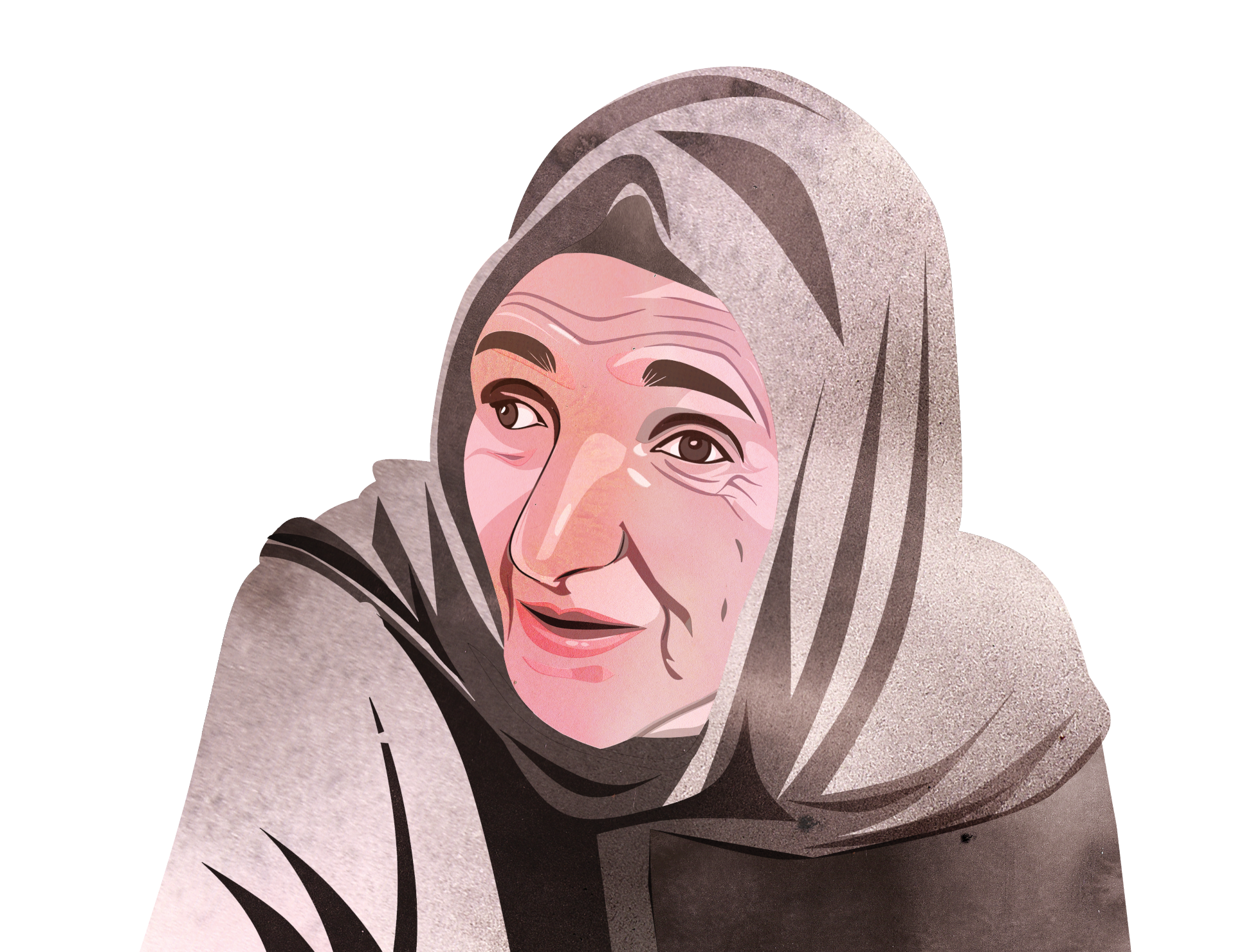Listen to this story
Around sundown on Aug. 31, 2021, a minivan stopped in front of Tova Moradi’s house in Kabul, Afghanistan. She had to get in as quickly and quietly as possible. Any attention could be dangerous. The Taliban had just taken control of Kabul two weeks prior. Their fighters were going door to door, hunting suspected opponents.
Despite her frailty, the 83-year-old Moradi was a prized target because she was Jewish and had misled the Taliban during its previous rule in the 1990s by sheltering a rabbi in her house. She needed to escape, and Israelis were helping her flee. The car’s engine made a nerve-racking sound as she pondered what to pack and what to leave — her clothes, a jewelry box, a set of precious china, hand-woven Afghan carpets.
Moradi was abandoning a house that she had lived in for decades. She felt her body glued to the floor, and she lacked the power to stand up and move until her son Musa again opened the door to her room: “It is not the time to think, Mother. Come on, leave,” he said, his voice trembling with nervousness. Musa held her hand, and as she slowly passed through her little garden, Moradi looked at her beloved rose bushes one last time.
Joining Moradi in the vehicle were Musa, his wife, Sharifa, their two children and a dozen strangers. The noxious smell of gas in the car, children crying in the arms of terrified mothers and men aggressively jostling into the vehicle didn’t bother her as much as the fact that she was leaving her home and country, perhaps forever.
“As the car moved away, I kept looking at the door to my house, our street and Kabul, and cried,” Moradi told me when I met her a year later in Toronto, where she settled.
The van took the passengers 208 miles north of Kabul to Kunduz, a province that shares a border with Tajikistan. The fact that Moradi and her family were traveling with around 100 Muslim Afghans provided some sense of security. So, too, did the fact that the people who traveled with Moradi were unaware of her Jewish heritage.
Their Afghan passports, Tajik visas and chartered Kam-Air flight to Dushanbe were all arranged and paid for by IsraAID, a humanitarian aid organization. Yotam Polizer, CEO of the organization, later told me that the Israeli-Canadian philanthropist Sylvan Adams picked up the tab.
Upon arriving in Dushanbe, the group remained in the airport terminal for four days until Albania agreed to host them temporarily. Moradi’s escape to find a sanctuary was terrifying and exhausting. “I cried as I left Kabul. In Mazar-e-Sharif, I was sobbing. I cried the entire way to Albania. Who would want to leave their house?” she later told me.
Her departure marked not only the end of her eight decades in Afghanistan but also the loss of the entire Afghan-Jewish community that had survived there for around 2,700 years. Moradi was the last member of her faith to leave Afghanistan; thousands more had emigrated in earlier decades, including her parents, siblings and three of her 10 children.
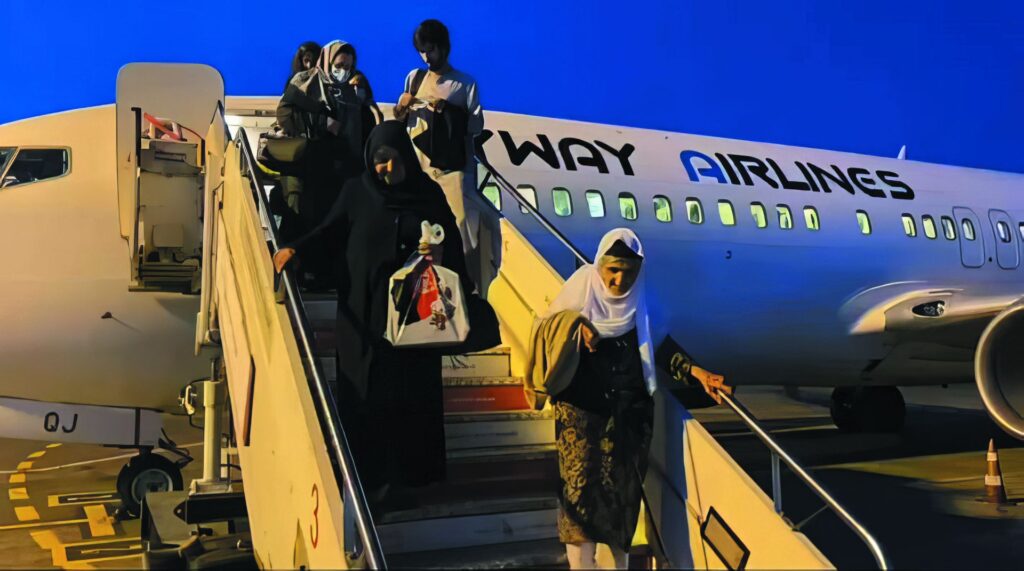
In many ways, her journey epitomizes the plight of Jews uprooted from Afghanistan and the challenges they have faced to survive and establish a home elsewhere. Yet her life story is even more painful. As a girl, she was wrested from her family and married off to a Muslim man three times her age. She raised 10 children in a majority-Muslim community where religious minorities have long suffered stigma and discrimination.
Moradi worshipped clandestinely in Kabul, sneaking off to the synagogue. She told her children that they were Jewish and tried to recall the prayers her father recited in the evenings on the Sabbath. She explained to her children what High Holidays like Yom Kippur meant. Through the few family pictures she kept hidden, she introduced them to a side of their identity that had to be concealed.
Her efforts to hold on to her faith exemplify both her vulnerability and her resilience: Moradi was not only Jewish but also a woman trying to survive in a patriarchal society that treated her as a second-class citizen.
Although official records of Jews in Afghanistan date to the seventh century, Yitzhak Ben-Zvi, a historian and former Israeli president, believed that they arrived much earlier, during the Achaemenid dynasty (550-330 BCE).
Pashtun tribes of Afghanistan referred to themselves as Bani Israel (Sons of Israel) beginning in the seventh century, and many members of the community still subscribe to the idea. While historians say there is little archaeological evidence to support this theory, they don’t have a full historical picture of Jewish life. So many ancient cities and places of worship that belonged to nonbelievers have been lost, and subjects were forced to convert to Islam in the attacks that followed the first major Muslim conquest in the seventh century.
What historians know for certain is that the arrival of the Mongols in the 13th century dealt an especially devastating blow to Jewish communities. Thousands of people were slaughtered, and cities with prosperous Jewish communities were destroyed.
The community managed to survive severe discrimination that continued over the centuries. Well into the 20th century, Jews were forced to wear black and blue clothing as identifiers, which often drew hecklers and stone throwers in the streets. For many years they were barred from owning businesses or property. Thousands left for Israel when the state was established in 1948.
When the Soviets invaded Afghanistan in 1979, the Jewish community numbered only 2,000. Most left the country during subsequent decades.
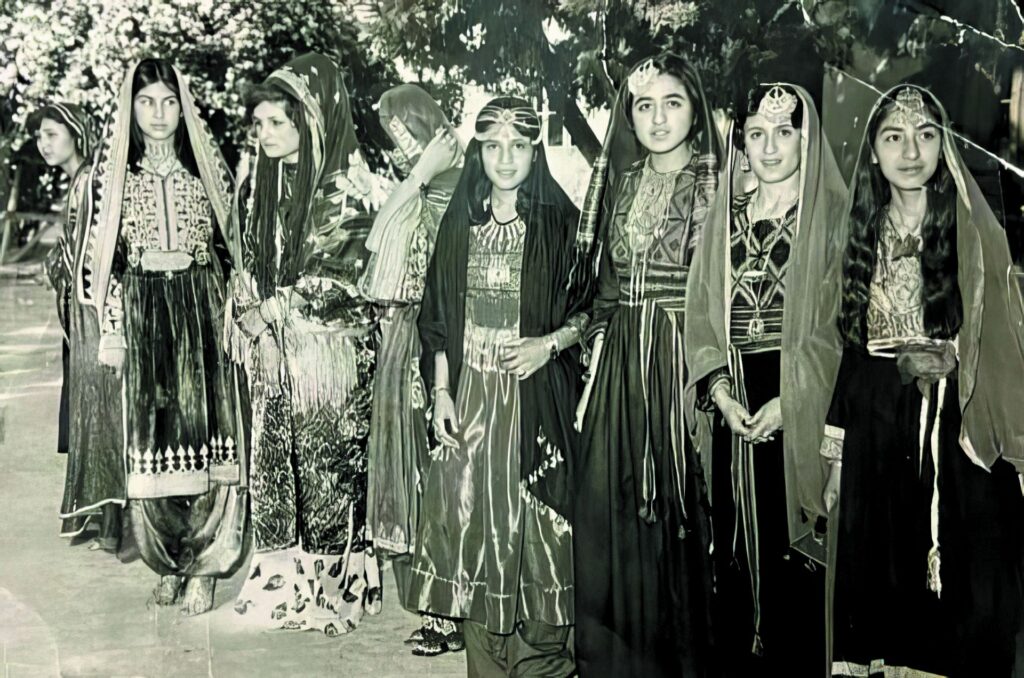
By the time Kabul was engulfed in civil war in 1992, only two Jews were thought to have remained in the country: Isaac Levi, the rabbi of the Kabul synagogue, and Zebulon Simentov, the synagogue’s caretaker. After the Taliban seized control of Kabul in 1996, both men were imprisoned at various times.
Following the fall of the Taliban regime in 2001 and a new constitution that guaranteed equal rights to all Afghans, life improved for religious minorities in the country. But little to no effort was made to preserve Jewish historical cities and documents. Jewish places of worship and cemeteries were largely neglected.
Simentov’s family fled to Israel after the civil war broke out. Levi, twice his age, stayed with him. Despite their complicated relationship and constant bickering in the media, they kept the doors of Kabul’s decaying synagogue open. Levi died at the age of 80 years old in 2005, and Simentov escaped the resurgent Taliban in 2021.
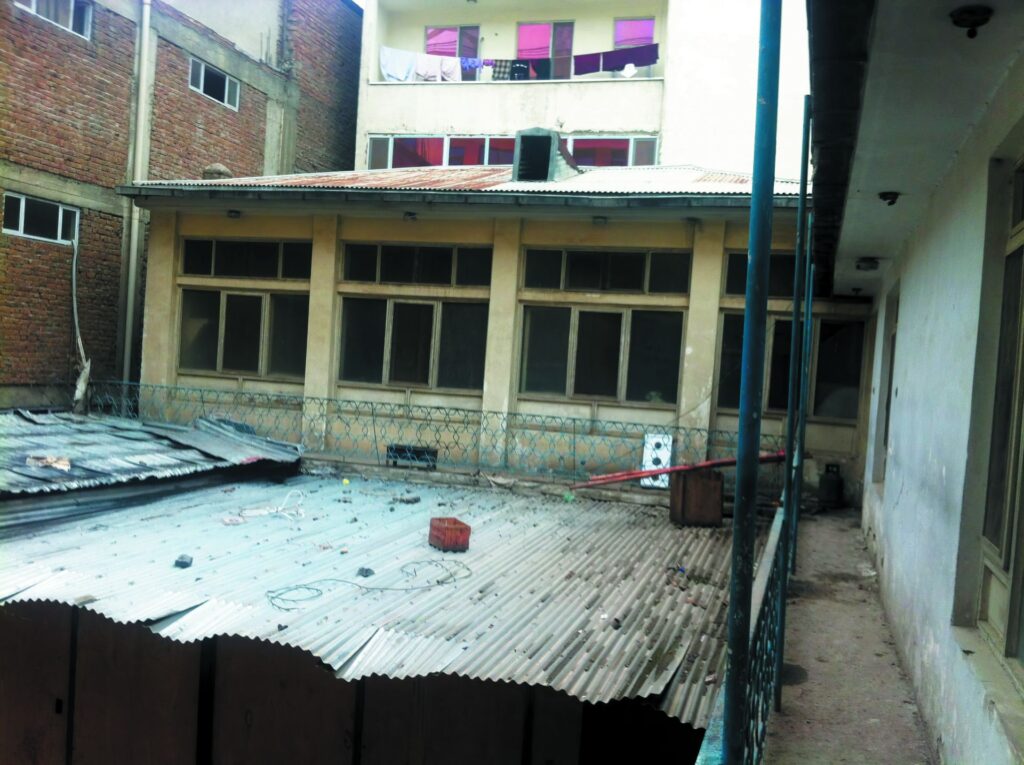
After the Taliban retook Kabul in August 2021, international media reported Simentov’s escape and eventual resettlement abroad. But almost no one knew about his distant cousin, Moradi. Until the Israelis spirited her out of the country, she had largely remained hidden from the world.
In my quest to piece together Moradi’s life story, I traveled to Toronto twice in 2022, accepting the possibility that because of her ill health and trauma, parts of her story may remain unknown.
I first met her in October. She had been living in Canada for almost eight months in a two-bedroom apartment, crammed together with Musa, Sharifa and her two grandsons, aged 8 and 10.
It was a grim abode. A street-level window was broken, and a stubborn fly made circles in the room, like a drone flying over Kabul. Moradi sat crouched over in gray clothes on the couch. She reminded me of a small bird without a nest. She was consumed by uncertainty and spoke in a low pitch.
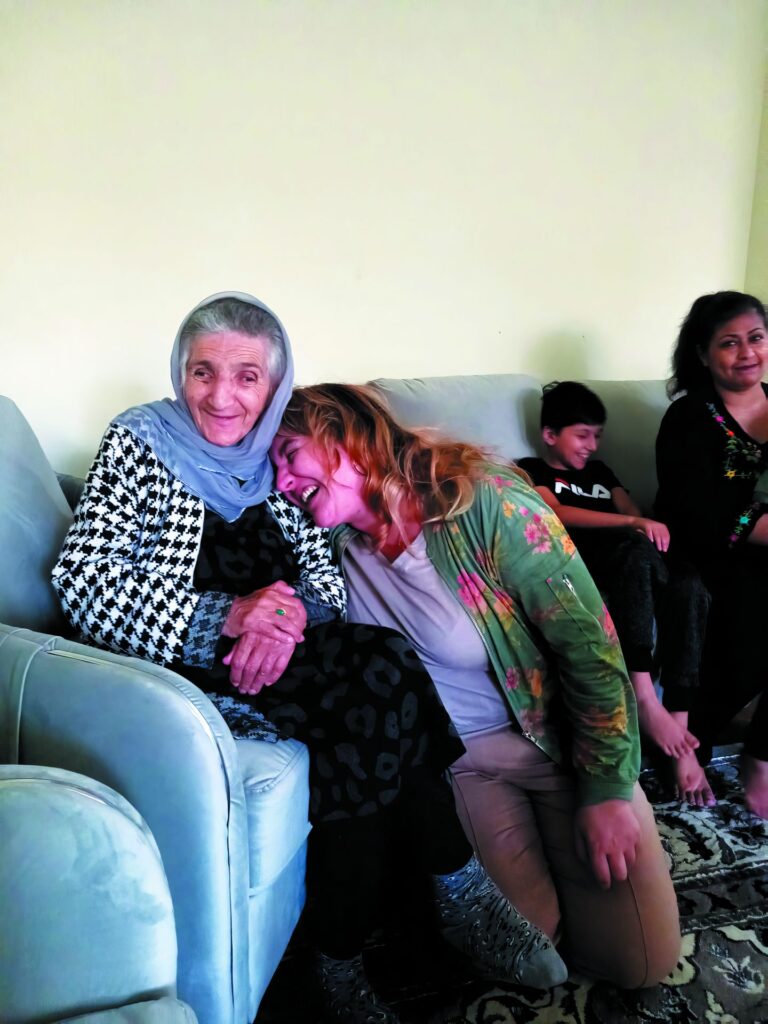
Her skin was so dry, thin and pale that one could count the bones in her hands. As she told me about her departure, she pressed her hands against her knees. Her back was slightly curved, she leaned in close, as if telling me a secret, and her whisper was barely audible at times.
The room had modest furniture and our hostess showered us with hospitality, serving the traditional Afghan green tea and sheer peera (a sweet bread). Overall the home was cozy, but I wondered how she tolerated her two beloved but rambunctious grandchildren teasing her. They made fun of her for watching Afghan national TV, run by the Taliban, and believing what it broadcast. “Grandma listens to Taliban news,” the 10-year-old laughingly told me while playing a noisy video game with his younger brother.
The rest of the family remained in the living room, frequently interrupting her as she spoke. Sharifa struggled to tape the broken window to keep flies out, and Musa kept speaking about the fear they faced as the Taliban took over Kabul. Everyone was talking over one another.
Despite the chaos, Moradi was eager to tell me about living in Morad Khane, the old city center of Kabul. She was born to a modest and well-respected Jewish family. Her father was an observant Jew who sold secondhand clothes. “We were poor and moved a lot to a succession of rented homes. People knew my father wherever we lived and respected him because he was a kind and pious man,” she said. “He worked all day, and he read the Torah at night,” she said of her father, adding that she made him tea while he prayed.
The circumstances of her marriage were less clear. She told me that her education ended when she married in the third grade, which would have meant she was 9 years old. Her daughter Khurshid, on the other hand, said that Moradi left her parents’ home at the age of 13 and married a 36-year-old man when she was 14. The lack of clarity about Moradi’s age isn’t unusual. Millions of Afghans, even today, don’t know their date of birth; they lack birth certificates. Babies are often born at home, and in many parts of the country it is uncommon to give birth in a hospital where babies could be registered.
As Moradi held my hand, telling bits and pieces of times with her parents and seven siblings, Khurshid interjected, insisting that her mother willingly left home. “My mother fell in love with my father and left everything behind for him,” Khurshid said. “My mother dreamed about the Prophet Muhammad when she was 13, and he asked her to convert to Islam, so my mother became a Muslim and ran away from home to a classmate’s house.”
“Had you seen the man you were marrying before?” I asked Moradi.
“No, never,” she replied. “We had not seen each other until I was married to him.”
Khurshid, Moradi’s youngest child, recalled growing up destitute in Rekha Khana, one of Kabul’s poorest neighborhoods. She said that her father, a government clerk, never interfered with her mother’s religious beliefs. “My father was a good Muslim and married her because of thawab,” she said, using the Arabic term that means a reward for good deeds, such as converting a non-Muslim to Islam. Moradi remained silent whenever her daughter spoke.
By the end of the interview, she was exhausted; we had spent the entire afternoon talking, and Moradi was due to take her medication. “I’m really sick these days,” she said weakly. Adjusting her chiffon headscarf as she accompanied me to the door, she added, “Come back, I’ll be glad to meet you.” She could hardly walk.
While meeting with Moradi, I learned that all of her children are married to Muslim Afghans. Some of her grandchildren are adults, well on their way to establishing themselves in the Muslim-Afghan diaspora. I suspected that her relatives did not want to jeopardize their position in the Muslim community by drawing attention to their mother’s ancestry.
Indeed — and understandably — Moradi’s elder brother, known as the family patriarch, and her nephews in New York refused to discuss her with me. Thus, I sought out Joseph Friedberg, a Canadian military major and rabbi who had played a pivotal role in arranging her escape from Afghanistan.
In his early 40s, of medium build, Friedberg often wears his military uniform as he divides his time between military service and helping Afghans and Ukrainians at risk. We met at the Beth Tikvah synagogue in Toronto’s Willowdale neighborhood.
Friedberg maintained that he never believed Khurshid’s story that Moradi had willingly married and converted to Islam.
“What are the chances of a third grader to one day suddenly wake up and run away from her parents, change her religion and fall in love with a man that is three times her age?” Friedberg said. “Her family in Israel has always said that Tova was groomed. At one point, she didn’t come home from school. Instead, she went to a friend’s home, whose father was a religious mullah. She was kept there for a couple of months, and then she was married off to his much older friend.”
Moradi was 12 at the time of marriage, he said. Her abduction was a matter of disgrace for the family because they couldn’t protect the girl. It was also terrifying, and they sent their eight other children to Israel afterward.
“They hardly spoke about it to anyone,” he told me. “I had to call her 95-year-old brother and push him to speak to me because we had to confirm her identity for the evacuation. It is an honor thing for a brother and a father, you know, especially when you are Jewish and a Muslim takes your girl away; it is not easy,” Friedberg said. He added that the account he provided was also based on the information that Moradi’s parents had shared with immigration authorities upon arrival in Israel about 70 years ago.
Friedberg told me that he had spoken with Moradi’s cousins in Israel and her nephew in the U.S., and they told him that the abductors had warned Moradi that they would kill members of her family if she didn’t go along with their story. Moradi’s family, he explained, otherwise avoids discussing her with strangers. Despite numerous attempts, I was unable to contact them.
Friedberg said that for a while Moradi’s father and then her older brother kept looking for her after she went missing. But eventually they gave up and moved to Israel.
Navigating through Kabul was difficult because most streets did not have names and most buildings had no address. Until the 21st century, making a phone call in Afghanistan was a luxury. Furthermore, Moradi’s husband was stationed in different provinces of Afghanistan from time to time, keeping the family mobile. As a result, Moradi’s parents would have been unable to locate her as she moved around the country. Moradi was also functionally illiterate.
Moradi, however, never ceased looking for a way to reconnect with her family, her past and culture. Later, when her husband was transferred to Kabul, she sneaked out of the house on Saturdays to the synagogue on Flower Street, hoping to find her relatives who had already left the country. She kept returning to the synagogue to seek comfort during times of hardship and sadness.
Khurshid recalled the day at the synagogue when Levi informed Moradi of her father’s passing in the 1980s in Israel and how her mother wept as they walked back home. “My mother started praying when she reached home, cried for a whole day and lit candles for the peace of his soul,” she said.
Over the decades, Moradi reminisced about her parents and kept a photo of her father wearing the traditional Afghan Karakul hat and her mother in modern Western attire alongside their children, which she stored in an aluminum box. “I remember that sometimes, my mother would open the box, look at the picture, speak to each of them for hours, and cry,” Khurshid said. She did not explain how her mother managed to hold onto the photo after the painful rupture from the parental home. Moradi showed me a screenshot of the photograph from the family WhatsApp group chat when I visited her.
Khurshid said that Moradi had written countless letters to her family, which she asked Levi to deliver on his trips to Israel. Moradi’s family in Israel told her in 2021 that none of the letters were delivered to them. It wasn’t clear what had happened. “I don’t know why, but Rabbi Levi was cruel,” Khurshid said, perplexed at the fact that Levi apparently delivered none of the letters from her to her family and vice versa.
The cruelty came from Muslims as well. Moradi had difficulty finding wives for her sons; people didn’t want their daughters to marry Jews. She eventually succeeded in marrying off all her children. “My mother had the patience of a camel. She fought for us,” Khurshid said.
Yet Moradi still hid Levi in her house for one month. In the late 1990s, the Taliban wanted to arrest him for suspected ties with the enemy state of Israel. Armed men came to her house hunting for him because someone had told them they were related. “I told the Taliban that he is a Muslim too and that he goes to mosque,” Moradi told me. “I felt sorry for him; he could have been killed.”
The rabbi fled to Pakistan but later returned to Afghanistan after the fall of the Taliban in 2001, when he gave an interview to the Washington Post about his ordeal with the Taliban. Because of this, Moradi feared that the Taliban would retaliate against her when they returned to power in 2021, so she felt it imperative to escape.
It was pure happenstance that Moradi was found in 2021. It all started in 2017 when Friedberg was looking for someone to work at his Kosher food restaurant in Toronto. Saeed, one of Moradi’s three children who had immigrated to Canada, applied for the job.
“When we met, he said he liked my Jewish hat,” Friedberg said, referring to his skullcap. Friedberg found the remark annoying and ignored it. Then Saeed said that he was Jewish and from Afghanistan. “I brushed it off because what is the chance of you meeting a random guy from Afghanistan and he is telling you that he is Jewish?”
Years later, in 2021, Friedberg said that he ran into Saeed, delivering pizza in his neighborhood. Crying, Saeed told him his mother was at risk of being killed by the Taliban. “I thought he was joking with me all these other times. I asked his mother’s name, and he said ‘Tova.’ It took me aback because it is a Jewish a name. Then, he told me that his mother was at risk because she had saved the life of Rabbi Levi.”
Friedberg said that at that point he made it his mission to save Moradi’s life: “I said I wouldn’t stop until it was done.” He worked with his military and diplomatic contacts in Israel to try to secure her evacuation.
The matter went all the way to the top, according to IsraAID CEO Polizer. He told me that Israeli President Isaac Herzog personally intervened in Moradi’s case. The journey of Moradi and her family to Tajikistan and then Albania cost about $500,000. “I was on this plane with her,” Polizer said, adding that Moradi was added to the nonprofit’s list of Afghan evacuees at the last minute.
Polizer described seeing Moradi for the first time as “a very powerful situation,” and he was struck by her outpouring of gratitude. “She addressed us as her brothers,” he said. “It was very emotional.”
Moradi flew to Tirana, Albania’s capital, and then took a bus to the Golem area, where she stayed for six months at the Kolaveri Resort Hotel. IsraAID paid almost $30 per person per night for accommodation, plus an allowance for food, health care and primary schooling for children.
Danna Harman, an Israeli journalist who also worked as a volunteer to help evacuate Afghans after the U.S. withdrawal in 2021, remained with the group. Moradi had been feeling unwell since they had left Kabul. She was twice hospitalized during the six months in Albania, including for a stroke, while waiting for her documents to be processed to immigrate to Canada.
Moradi told me that she agonized during the escape from Kabul. She worried about her children who left in a separate group. But Albania was also where her dream came true. As soon as she arrived in September 2021, Moradi spoke with her sister for the first time in 70 years. “We both cried for an hour. We didn’t talk. We just cried,” she said. It was during that phone call that she learned about the death of another sister and a brother.
Moradi wanted to see Khurshid and two sons who already lived in Canada. She was finally able to fly there in February 2022. Despite the long and arduous journey, Friedberg said that he was struck by the resilience and strength of the tiny woman. But there’s no happy ending yet. “It is a very sad story,” he said. “She is still holding on, but she needs closure.”
This closure remains elusive, and Moradi and her family are losing the thread of their ancient heritage. She rarely leaves the cramped basement where she now lives. She says that her body aches all over and she sometimes has trouble walking or standing upright.
When we met in September, she was recovering from a recent fall in the bathroom. She showed me the scar it left on her nose and lifted her sleeve to reveal blue patches on her arms. “I have no idea what happened to me,” she said.
Musa does not observe Jewish customs or go to synagogue. Neither he nor another son, Mahboob, who also lives in Canada, consider themselves to be Jewish. “Afghanistan is a patriarchal country, and mothers do not have much say in the faith of their children,” Mahboob told me during a brief conversation over the phone. “It is the father that decides and guides the children, not the mothers.” However, he said that they have respect for their mother’s lineage.
Having finally caught up with her remaining three sisters and two brothers who live in Israel, Moradi calls them most days. She is particularly close to the eldest, her 90-year-old brother, Roshel. They talk about daily life, their children, Afghanistan and their shared past. Moradi does not go to any synagogue. She never goes anywhere, in fact.
Khurshid immigrated to Canada in 1999 for an arranged marriage to a Muslim Afghan. We met in December of 2022 at a Starbucks close to her home, a modern condominium that was given to her by someone in the Jewish community. New Lines is withholding the city where she and her family members live to protect their privacy as per their request. Khurshid said that in highly conservative Afghanistan, her mother had to tell people she was a Muslim.
When Khurshid was young, classmates tormented her for her background. “They said Jews would give you a poisonous apple and eat you,” Khurshid told me. She said that until fifth grade she was bullied and sat alone in the back of the classroom. It made her angry at her mother for being Jewish. “One day, I came home crying and started hitting my mother, asking her why she was Jewish. Every time, my mother would sit me down and explain that it is not something that she can change, and it is not something to be ashamed of. She always told me that I have to accept that my mother is Jewish as a fact. I understand it now. But then I was a child.”
Khurshid’s parents eventually decided to move to a neighborhood where people didn’t know about Moradi’s background. Khurshid said that she never again told anyone that her mother was Jewish. “It is not because I was ashamed, but because people didn’t understand that I am a good person and my mother is a sweet and kind woman, and being Jewish is a normal thing, like being Muslim or Christian.”
At first, Khurshid readily consented to my meeting with her and Moradi in Canada. But as she began reflecting on her religious persecution back in Kabul, Khurshid grew uneasy about sharing her mother’s story. She didn’t want others in the Canadian Afghan community to know they were Jewish in case her own children suffered the same harassment. She explained that she and her brothers had established their lives in the Muslim community. “Afghans blame everything on Jews and Israel; the hate speech online is so obvious every time something goes wrong between Israel and a Muslim state,” she said.
Khurshid told me she received hateful messages on Facebook from Afghans who had read about her mother in the Canadian press. “They called my mother a Jewish spy and ugly,” she said. “I was afraid that someone would push her down the stairs. Or you could hit her with something. She is vulnerable and could die.”
According to Khurshid, her daughters, aged 23 and 17, have also suffered for their identity. “One day, my older daughter came home crying and told me what if her Muslim friends would see the news and abandon her,” Khurshid said.
Khurshid said, however, that her 17-year-old could not wait to tell her classmates that she was “a bit Jewish.” But the worried mother counseled her daughters not to talk about it publicly. She was afraid that she wouldn’t be able to find them husbands. “Try to understand me. If I go to synagogue, my brother, who is well respected in [Canada’s] Muslim community, will be kicked out of the mosque.”
Moradi is aware of her approaching mortality and wants to visit her parents’ graves in Israel and meet her siblings and their children there. Leaving Afghanistan meant abandoning everything she had built over the years, including solid friendships, something that she feels too old to develop in Canada today.
However, Khurshid is concerned about her mother’s declining health and her ability to make the nearly 6,000-mile journey to Israel from Canada. Another constraint Khurshid mentioned was the family’s weak financial situation.
But Friedberg, who was heavily invested in Moradi’s evacuation and spent hours talking and meeting with her children, thought those were flimsy excuses. “Her children are too fixated on the Muslim community and too comfortable, so perhaps they don’t want to stir any conversations about Tova’s Jewish heritage,” Friedberg explained.
Polizer assured me that if requested, the organization would extend all possible assistance to reunite Moradi with her family in Israel.
In the meantime, Moradi grows ever weaker. She walks more slowly than before and spends more time in her room. When I returned to Toronto in December 2022, she had lost her appetite and the energy to talk. She also felt increasingly agitated. She knows it’s impossible to return to Afghanistan as long as the Taliban are in power. And their rule will most likely outlive her.
“Oh, my child,” she said, gripping my hand in her cold, dry one. “I am old and so weak now. So many things I wish now will not come true. I am so tired.”
This article was published in the Fall 2023 issue of New Lines‘ print edition.
Become a member today to receive access to all our paywalled essays and the best of New Lines delivered to your inbox through our newsletters.



